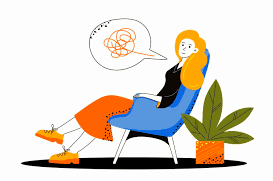Mental Stress Treatment: Effective Ways to Manage Stress
Introduction
Mental stress treatment:In today’s fast-paced world, mental stress has become a common issue affecting millions of people globally. From workplace pressure to financial worries, relationship challenges, and health concerns, stress can manifest in many ways. While short-term stress may motivate us, chronic stress can have damaging effects on both mental and physical health.
Fortunately, there are proven methods for mental stress treatment that can help individuals regain balance, improve well-being, and enhance quality of life. In this article, we will explore different approaches to treating mental stress, including lifestyle changes, therapy, relaxation techniques, and professional care.
Understanding Mental Stress
What Is Mental Stress?
Mental stress is the body’s natural response to external or internal pressure. When demands exceed a person’s ability to cope, stress hormones like cortisol and adrenaline increase, leading to feelings of anxiety, irritability, and fatigue.
Common Causes of Mental Stress
- Heavy workload or academic pressure
- Financial struggles
- Relationship conflicts
- Uncertainty about the future
- Health problems or caregiving responsibilities
- Lack of sleep and poor lifestyle habits
Symptoms of Mental Stress
- Constant worry or overthinking
- Irritability and mood swings
- Headaches, fatigue, or muscle tension
- Difficulty concentrating
- Changes in appetite or sleep patterns
Recognizing these symptoms is the first step toward effective mental stress treatment.
Effective Mental Stress Treatment Options
1. Lifestyle Modifications
Small but consistent lifestyle changes can reduce mental stress significantly.
Practical Tips:
- Exercise regularly: Physical activity boosts endorphins, which act as natural stress relievers.
- Eat a balanced diet: Nutrient-rich foods like leafy greens, nuts, and whole grains help stabilize mood.
- Get enough sleep: Aim for 7–9 hours of quality sleep every night.
- Limit caffeine and alcohol: These substances may worsen stress and anxiety.
2. Relaxation Techniques
Practicing relaxation methods is one of the most effective ways to reduce mental stress.
Examples of Relaxation Practices:
- Deep Breathing Exercises: Slow, controlled breathing lowers cortisol levels.
- Progressive Muscle Relaxation: Tensing and releasing muscles relieves tension.
- Yoga: Combines physical postures, breathing, and meditation for holistic stress relief.
- Meditation: Promotes mindfulness and calms racing thoughts.
3. Mindfulness and Meditation
Mindfulness encourages staying present without judgment. Regular practice can:
- Improve emotional regulation
- Reduce anxiety and depression
- Enhance focus and resilience
Apps like Headspace or Calm can guide beginners in incorporating mindfulness into daily life.
4. Cognitive Behavioral Therapy (CBT)
One of the most widely used psychological treatments for mental stress is CBT. This form of therapy helps individuals:
- Identify negative thought patterns
- Replace them with healthier beliefs
- Develop coping strategies for stressful situations
CBT is evidence-based and highly effective for long-term mental stress treatment.
5. Social Support and Connection
Humans are social beings, and isolation can worsen stress. Building a support system can significantly improve well-being.
Ways to Strengthen Support:
- Talk openly with friends or family
- Join support groups or community activities
- Seek professional counseling when needed
6. Time Management Techniques
Poor time management often contributes to stress. Effective methods include:
- Prioritizing tasks using to-do lists
- Breaking large projects into smaller steps
- Avoiding multitasking
- Scheduling regular breaks to recharge
7. Professional Mental Stress Treatment
Sometimes, self-help strategies are not enough. In such cases, professional intervention is recommended.
Options Include:
- Therapists and Counselors: Provide guidance and coping strategies.
- Psychiatrists: May prescribe medication for severe stress, anxiety, or depression.
- Stress Management Programs: Structured workshops to build long-term resilience.
8. Alternative and Holistic Approaches
Complementary therapies can also aid in stress reduction.
Examples:
- Aromatherapy: Essential oils like lavender promote relaxation.
- Massage Therapy: Reduces muscle tension and enhances calmness.
- Acupuncture: Helps balance energy and relieve stress symptoms.
- Art or Music Therapy: Encourages emotional expression and healing.
Practical Daily Routine for Mental Stress Treatment

Here’s an example of a daily plan to manage stress effectively:
- Morning: 10 minutes of meditation + light stretching
- Daytime: Balanced meals, hydration, and scheduled work breaks
- Evening: 30 minutes of walking, yoga, or exercise
- Night: Screen-free time before bed, journaling, or reading
The Role of Nutrition in Stress Management
What you eat can influence your stress levels.
Foods that Help Reduce Stress:
- Omega-3 fatty acids: Found in fish, walnuts, flaxseeds
- Magnesium-rich foods: Spinach, bananas, pumpkin seeds
- Herbal teas: Chamomile and green tea promote calmness
- Dark chocolate: In moderation, it reduces cortisol levels
Avoid processed foods and sugary snacks, as they may trigger mood fluctuations.
Long-Term Benefits of Stress Management
Investing in mental stress treatment brings long-term rewards:
- Improved mood and emotional stability
- Better focus and productivity
- Stronger immune system
- Reduced risk of chronic diseases like hypertension and heart problems
- Enhanced relationships and overall quality of life
Conclusion
Stress is an inevitable part of life, but it doesn’t have to control your well-being. By adopting healthy lifestyle habits, practicing relaxation techniques, seeking professional guidance when necessary, and building strong social connections, you can effectively manage and reduce stress.
Remember, mental stress treatment is not a one-size-fits-all approach. Experiment with different strategies, stay consistent, and prioritize self-care. With the right tools, you can lead a healthier, calmer, and more fulfilling life.
FAQs About Mental Stress Treatment
1. What is the best treatment for mental stress?
The best treatment combines lifestyle changes, relaxation techniques, therapy, and sometimes professional support, depending on the severity.
2. Can exercise help reduce mental stress?
Yes. Exercise releases endorphins, improves mood, and reduces stress hormones, making it an excellent natural treatment.
3. Is medication necessary for stress treatment?
Not always. Medication is typically used for severe cases under medical supervision, while mild stress can often be managed naturally.
4. How long does it take to reduce stress with treatment?
It varies. Some people feel relief within days of practicing relaxation techniques, while others may need weeks of therapy or lifestyle adjustments.
5. Can diet play a role in mental stress treatment?
Absolutely. A balanced diet rich in nutrients supports brain health, reduces anxiety, and enhances resilience against stress.





